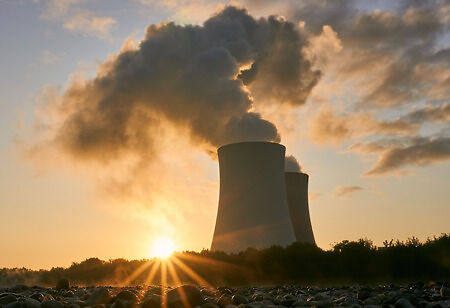
The Coast is Clear for Nuclear Energy's Bounce Back into the Market


Nuclear power is one of the greatest examples of the phrase, “With great power comes great responsibility.” There have been many accidents caused by this volatile yet provocative form of energy, but a handful of them remain synonymous with the word devastating till today. The horrors of Chernobyl, Fukushima, Kyshtym, Windscale, and Three Mile Island nuclear disasters are by far the most severe cases of nuclear power destruction recognized by the International Nuclear and Radiological Event Scale (INES).
Today, thanks to the latest technologies and growing concerns around climate change, the world is turning back to seeking the aid of nuclear energy mainly since it does not leave behind greenhouse gas emissions.
Accordingly, a gathering of nuclear energy leaders discussed the possibilities of what new avenues they could draw after resurrecting this powerful form of atomic energy. Moreover, the Department of Energy stated the fact that the demand for advanced nuclear reactors could be worth up to $ 1 trillion globally.
A Global Demand Worth $ 1 Trillion
To start, Jennifer M Granholm, United States Secretary of Energy, revealed that nuclear energy sums up 20 percent of the US’s baseload power, while 50 percent represents no-carbon emissions power. These percentages are coming from the existing fleet that they have today. It’s only a matter of time to witness what amounts upcoming developments in this space could offer.
But of course, future nuclear reactors could function a bit differently due to the kind of technology that will be developed. For that, the US labs, as well as private companies, are pouring their money into research to devise reactors that are budget friendly and generate less waste.
While there is demand, there are also employment opportunities to expect, from building those reactors to working on respective supply chain tasks that will contribute to the growth of the industry.
Until the change in mindset to bring back nuclear power, the idea was cast aside or treated as an outcast during most COP (Conference of the Parties) meetings. It shows how IAEA (International Atomic Energy Agency) went from receiving spiteful stares to welcoming arms promoting the growth of the nuclear power segment. As a matter of fact, the IAEA is already booking its seat to attend the next COP conferences that will be organized at Sharm el-Sheikh, Egypt, this year and Dubai Expo city in the United Arab Emirates (UAE). The idea of COP conferences that will be held in these two locations implies what is taking place, how things are changing and the opportunities bestowed before humanity.
With new technological developments being planned and worked about, surely the safety and security concerns are also placed on top priority.
What Safety and Security Means for Nuclear Energy
Safety and security in the nuclear field are closely related, as are safeguards in connection to nuclear power. There are some distinctions.
The focus of safety is on unforeseen circumstances or events that result in radioactive leaks from permitted activity. It primarily refers to inherent issues or dangers.
Security is concerned with the deliberate use of nuclear or other radioactive materials for malicious purposes by non-state actors. It mostly has to do with dangers to supplies or facilities from the outside.
The goal of safeguarding is to prevent states from taking action that might result in the development or acquisition of nuclear weapons. Materials and equipment related to rogue governments are the key topics.
Achieving International Co-operation through Safety and Security
Radioactive sources are scattered all around the world, offering immense societal and economic benefits, and are being operated with safety measures. Speakers from the International Conference on Safety and Security of Radioactive Sources pointed out that managing these sources is important to prevent mishaps or being found with the wrong hands.
The IAEA supports countries in managing radioactive sources through the IAEA Safety Standards, the IAEA Nuclear Security Series, and the Code of Conduct on Safety and Security of Radioactive Sources. Under these programs, the IAEA provides international standards, requirements, and recommendations that establish as well as bolster the national regulatory infrastructure. Bits of Advice on the development, harmonization, and implementation of national policies, laws, and regulations, as well as on cooperation among countries, are provided.
On the other hand, globalization seems to appear as an opportunity for international cooperation and could likely ensure safety and security at a higher level. The meeting also discussed about new technologies making their way into this space should first be examined for the two aspects, including environmental harm from ionizing radiation.
Let’s look at the current matters taken care of in the Nuclear Security Series provided by the IAEA.
- Nuclear Security Fundamentals: establish the fundamental objective and essential elements of a State's national nuclear security regime.
- Recommendations: set out measures that States should take in order to achieve and maintain an effective regime.
- Implementing Guides: guidance on how States can implement the Recommendations.
- Technical Guidance: more detailed guidance on specific methodologies and techniques for implementing security measures.
As States endeavor to fulfill their responsibilities for nuclear security, the IAEA's Nuclear Security Series offers international consensus guidance on all facets of nuclear security.
Nuclear security, like nuclear safety, attempts to safeguard individuals, assets, society, and the environment against the negative consequences of ionizing radiation. Work to promote nuclear safety is defined as addressing the dangers posed by radiation sources during routine use and by potential incidents. Intentional harmful acts involving radioactive substances or directed against places or things where such substances are employed what nuclear security work aims to stop, identify, and respond to.

